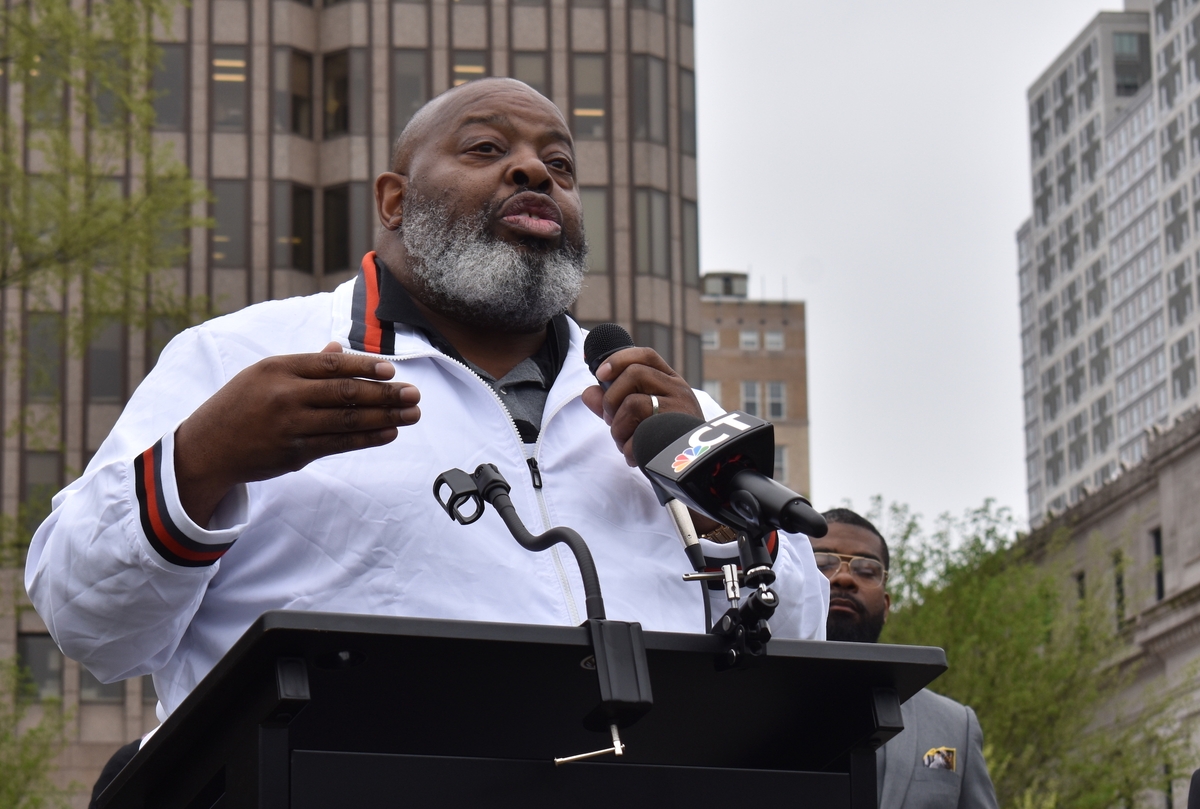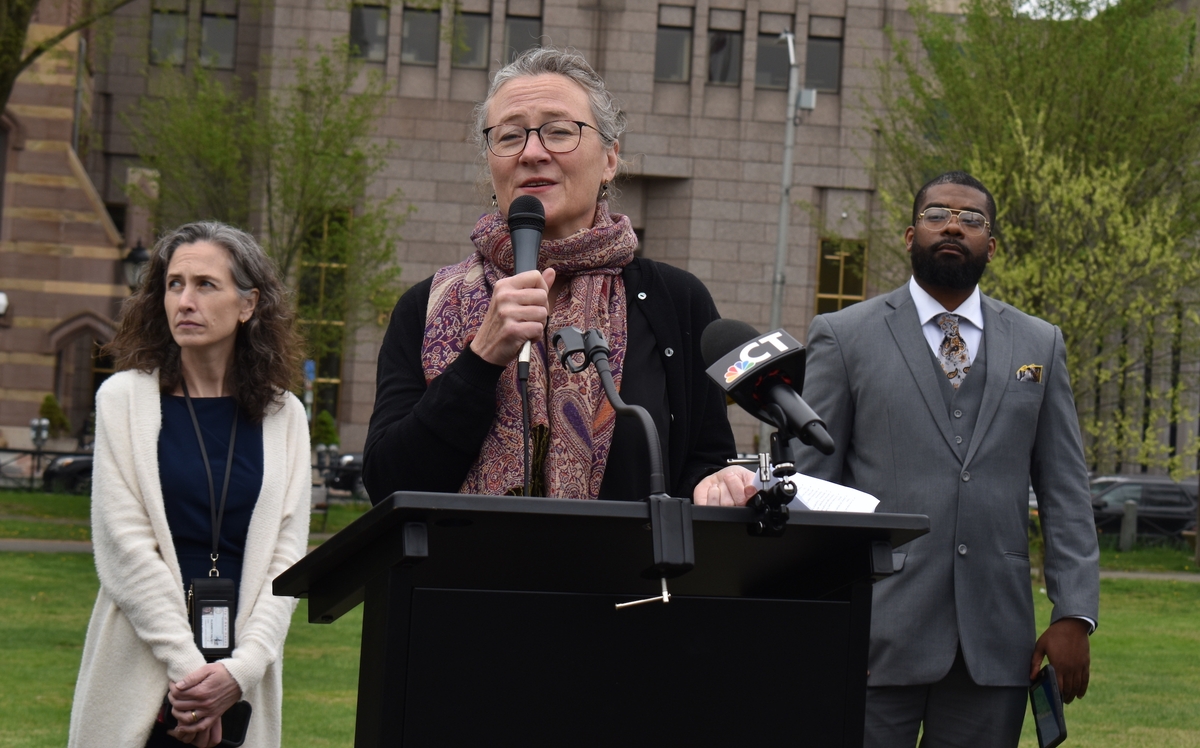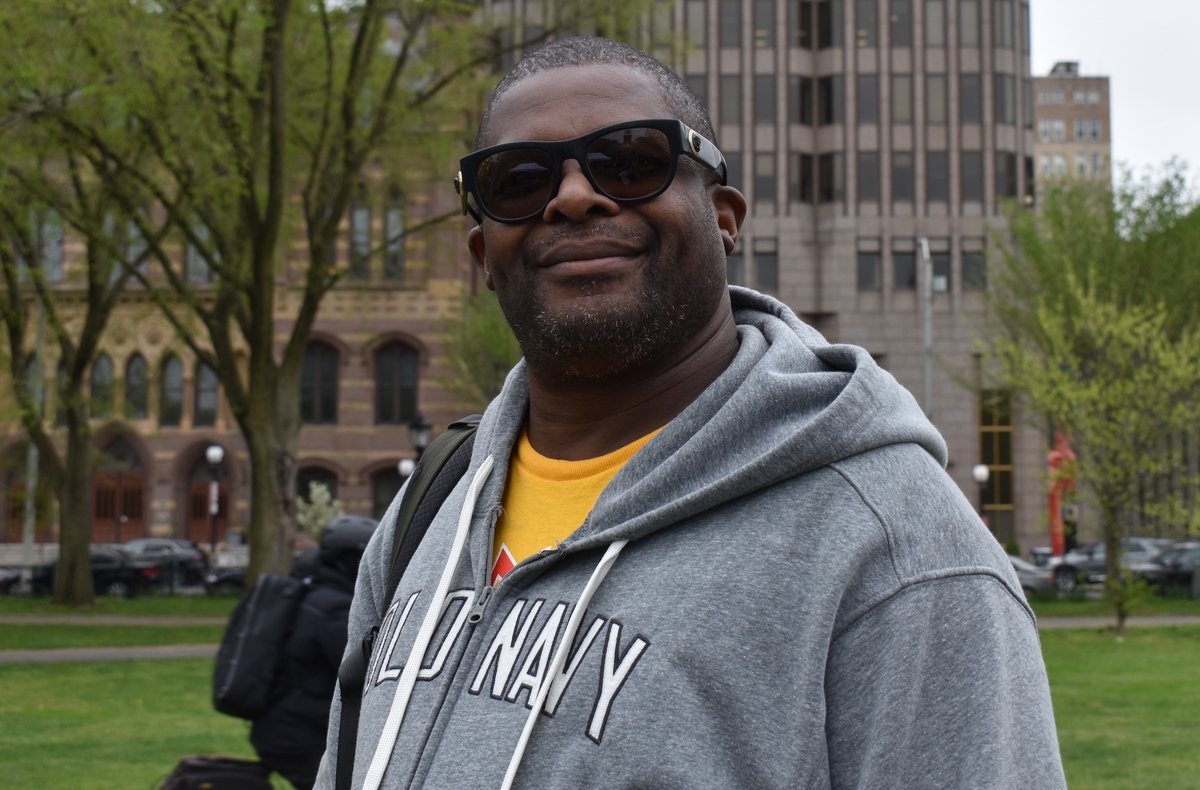
Laura Glesby PHoto
Eric Providence of Columbus House, one of the project's advisors, recalled coming home from prison over two decades ago and "knocking on doors" closed shut in an effort to rebuild his life.
A new Yale study will provide one-on-one financial guidance to 238 New Haveners transitioning out of prison, while advocating for longer-term change to reduce poverty among formerly incarcerated people.
The initiative, called the Recovery Finance Project, began recruiting formerly incarcerated participants who have struggled with mental health (including substance use disorder) at a press conference on the New Haven Green on Tuesday afternoon.
The program posits that a person’s efforts to recover from mental health and addiction crises and to rebuild their lives outside of prison will have a hard time succeeding without a basic financial safety net.
“There can be no mental health justice, no criminal justice reform, no racial justice… without economic justice,” said program co-founder and Yale psychiatry professor Annie Harper.
Harper and other speakers noted that people leaving prison can struggle to obtain identification, open bank accounts, rebuild their credit, obtain housing, and find employment, in part due to preconceptions that some institutions hold about formerly incarcerated people as well as a lack of assistance in navigating financial programs.
Participants approved for the study will receive personal financial coaching from Winning Ways, a local financial and personal development organization that works with people transitioning out of prison, founded by people who have personally experienced financial hardship after addiction or incarceration.
Half of those participants will also receive peer mentorship from the Yale School of Medicine’s Program for Recovery and Community Health (PRCH), allowing researchers to assess the effects of receiving support from people who have personally experienced mental illness, addiction, and incarceration.
In order to qualify, participants must have exited prison within the last 24 months, be at least 18 years old, and either live or receive services in the city of New Haven.
Within a handful of hours, according to psychiatry researcher Elizabeth Flanagan, at least 80 people had filled out initial screening forms for the study.
On top of one-on-one guidance for participants, the Recovery Finance Project will advocate for policy reform and offer trainings to local banks and credit unions on how to better serve formerly incarcerated people.
According to Harper, the trainings will aim to address “discriminatory attitudes” toward people with a history of mental illness, drug use, and incarceration. They will also highlight more accessible programs that banks can adopt, such as accounts that have no overdraft fees, to help formerly incarcerated clients build a stable financial foundation.
The program, housed within the Yale Program for Recovery and Community Health, received a $1.6 million grant from the National Institute on Minority Health and Health Disparities (NIMHD).

Yale Professor Annie Harper with city Community Services Administrator Eliza Halsey and Winning Ways' Kevin Paulin.
The Recovery Finance Project has prioritized collaborating with people who have themselves spent time in prison, including by way of a community advisory board.
“Our programs are rooted in lived experience,” said Winning Ways founder Kevin Paulin. “I want y’all to be proud of yourselves because this is my community.”
Mayor Justin Elicker pointed out that addressing post-incarceration poverty could lead to less recidivism, by reducing the likelihood that people leaving prison will need to turn to illicit income sources in order to survive.
According to state data, 43 percent of people who left a Connecticut prison in 2019 were re-incarcerated within three years. “Some people say that says something about those people,” said Elicker. “I say that says something about us.”
The organization 4‑CT has also piloted a New Haven-based program over the last year offering a monthly payment of $500 to formerly incarcerated people for one year.

Emico Jones: Include young people in financial literacy efforts.
Among the 30 or so people who gathered for the press conference included Enico Jones, who had heard about the program on the radio.
Jones himself had recently gotten out of prison. He said he “definitely” would have benefited from financial coaching, as it was hard to find employment with a criminal record. He is currently applying for a truck driving job, having recently obtained a commercial driving license, he said.
Listening to speaker after speaker tout the new study, Jones found himself skeptical. First of all, he said, “nobody mentioned nothing about the youth” — and the people signing up for the program didn’t seem to be very young, in his opinion.
“The youth coming out — they don’t have no financial guidance,” he said. “Sign up more younger people to be involved.”
Jones also said he wasn’t sure he fully believed that the services promised would actually be delivered. Lots of people hand out business cards and promise to help without actually following through, he said. Why should he believe the professors running the study?
To earn the trust of people old and young who are getting out of prison, Jones suggested, the Recovery Finance Project should call participants on a regular basis and form relationships with the people they serve.
People interested in learning more about and potentially enrolling in the study can call (203) 764‑8602 or email [email protected].



Mr Jones has a very good point about young people needing to be educated in financial literacy.
Also-
The state of CT needs to stop charging inmates for their room and board under the pay to stay laws. They need to stop seizing inheritances, social security survivor benefits or spousal benefits and other funds from former inmates years after they have completed their sentences.
And Connecticut charges foster care children by seizing their social security survivor benefits if a foster child’s parent dies.
These practices help to enforce poverty that a former inmate or former foster child has difficulty overcoming to get a good start on a new life after they are released from custody.
The state should eliminate these practices, as these are captive audiences as wards of the state during their time in custodial care.
I hope this program for helping mentally ill or addicted former inmates get the care and resources they need to get their act together and survive successfully and avoid getting into trouble in the real world, continues to serve people in this manner beyond the time limits of the study. It could be transformative in reducing recidivism.